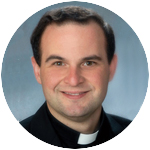
Father Eric J. Banecker
I recently spent a bookstore gift card on a memoir by Michael Brendan Dougherty called “My Father Left Me Ireland.” I had read several positive reviews of it online, and it piqued my interest. Not to give too much away, but the story is sadly a familiar one.
A couple falls in love and has a child. The man falls out of love and leaves the woman to fend for herself with their child. In this case, the man returns to his home in Ireland, where he would raise a whole family with another woman. The scorned woman is left to work and raise her child with the help of her parents and surrogate parents in the neighborhood, all the while maintaining some contact with her son’s estranged father, with whom she is still quite in love and — at the same time — profoundly angry.
Tied into this story is a complementary one: Dougherty’s embrace of Irish history and culture, promoted by his conflicted mother as a kind of unspoken replacement for his Irish father. Dougherty shares his own experiences through the lens of Ireland’s chaotic and painful history.
[hotblock]
That is not the whole story, but it is worth pausing there for a second. Many have pointed to a “crisis” of fatherhood in our time. In one sense, I think the human experience of fatherhood has been fraught with problems since the Fall. But what Dougherty explores is the problem of men who conceive a child and then vanish into the ether. The child is left, as a result, with a profound sense of rootlessness, a major void in one’s self-conception.
And do not our “fatherhood problems” affect our understanding of God as father? After all, God’s fatherhood is a constituent part of revelation (Lord, teach us to pray … when you pray, say “Our Father who art in heaven”). The Lord’s Prayer is not some minor point hidden in the back of a textbook, but, for most Christians, a daily act of reverence for God.
And while God’s fatherhood far transcends even the most excellent human father, we still should not be surprised at the rise of widespread ambivalence about the question of God.
After all, for many people in our age, their human experience of fatherhood is just that: ambivalent, if not altogether absent. This should serve as a call to responsibility for the many good and faithful fathers among us: their actions quite often shape their children’s religious experiences in a fundamental way for a long time.
The crisis of human fatherhood is being experienced side-by-side with a crisis of spiritual fatherhood in the priesthood and episcopacy. As with human fatherhood, there has been from the beginning of the church a need for constant renewal among members of the clergy.
[tower]
In one sense, there is nothing new about our current problems — most of the failures that have been revealed in the last 20 years on front pages could have easily been said in many other periods of history. And yet, the reality that sin is very uncreative should not in the least make us complacent or quietists.
As clergy, religious and laity, we all must embrace this time in history for what it is: a massive clean-up effort. Many people try to reduce recent scandals down to a problem of sexual identity, but I think this is an oversimplification. At issue, really, is the question of the abuse of power, whether expressed in physical, verbal, financial, or even liturgical ways.
It is also expressed in a kind of communal self-deception which ignores major problems out of fear. There are sometimes occasions, of course, when issues often don’t become “addressable” until the problem has become intractable. But we must recall that spiritual fatherhood demands our fidelity and a true desire to grow in holiness. As with human fatherhood, where this is lacking, many others suffer in their experience of God.
By the end of “My Father Left Me Ireland,” Dougherty gives us a glimmer of hope. Through very trying periods of his life, he does come to a kind of reconciliation with his father. We learn that they had never definitively left each other’s lives, although for many years their relationship was tense, awkward and marked by years of miscommunication or none at all. The reconciliation which does take place is neither perfect nor easy.
One cannot simply go back and pretend the past did not occur: that would be an injustice, and at any rate it is impossible. But that in itself does not make healing impossible. Healing always comes on the other side of suffering, sometimes long and painful suffering. But this, after all, is the light on the other side of darkness, the empty tomb on the other side of the cross.
True fatherhood has its source and origin in God. When we catch glimpses of it through our human and spiritual fathers, it is a cause for great joy. When fatherhood is marred by absence, scandal and pathologies of those who claim such a title, we are rightly disturbed and confused.
And yet, as Michael Brendan Dougherty shows us, there is a way forward, however gloomy it may seem. It is the grace of reconciliation and renewal — even if it is painful, plodding and slow.
***
Father Eric J. Banecker is parochial vicar at St. Pius X Parish in Broomall.



Share this story